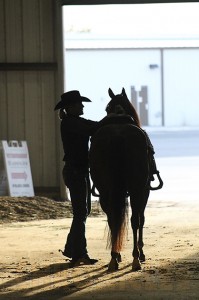EHV-1 Update For Week of May 18th- Pennsylvania, Illinois, Iowa, Oregon
The Equine Disease Communication Center works to protect horses and the horse industry from the threat of infectious diseases in North America. Visit www.equinediseasecc.org to stay abreast of equine disease news.
Pennsylvania — May 18
The Pennsylvania Department of Agriculture announced on May 18 a quarantine of an equine barn in Tionesta, Forest County, after a horse at the barn tested positive for equine herpes virus type-1 on Wednesday, May 13.
A horse from the Forest County barn was used in the Tionesta Wounded Warrior Horseback Scavenger Hunt, where 94 horses took part, including horses from Ohio and West Virginia.
An equine barn in Shippenville, Clarion County, housing an exposed horse that showed clinical signs of EHV-1, was put under precautionary quarantine Thursday, May 14, until the pending laboratory results are confirmed. Two additional horses from the Forest County equine barn have shown signs of illness after being exposed to the positive horse.
The Pennsylvania Department of Agriculture is in the process of tracing the horses that participated in the scavenger hunt, and has notified animal health officials in Ohio and West Virginia.
The barns and horses are quarantined for at least 21 days. The quarantine can be lifted after that three-week period. Strict sanitary and biosecurity standards are then enforced.
Horse owners with concerns may contact the Department of Agriculture’s Bureau of Animal Health and Diagnostic Services at 717-772-2852.
Illinois — May 18
Horses residing at the affected stable in northeast Illinois continue to recover. No additional fevers or clinical signs are being reported. A minimum of 28 days should elapse without any additional illness before individual horses are sampled and tested for virus. A negative nasal swab PCR test is an indicator that the horse is no longer shedding virus.
An individual who boards a horse at the stable and also has four horses at their home reported that a pony on the home premises experienced neurologic signs of disease, was subsequently euthanized, and tested positive for EHV-1. It is believed that the horse owner may have inadvertently transferred the virus from the affected stable to their home premises.
On Friday, May 8, the Illinois Bureau of Animal Health and Welfare was notified that two horses located in a stable in Northeast Illinois tested positive for EHV-1 via the nasal swab PCR test. Additional horses at the same stable had exhibited fevers throughout the week of May 4. Three horses have exhibited neurologic signs of disease and two of those horses have been euthanized. All horses on the premises have been restricted to the stable and are being monitored daily for signs of disease. Stable personnel have been instructed to eliminate direct contact between horses as much as possible and to segregate sick horses from healthy horses as well as limit personnel entering the barn. The stable manager has implemented enhanced cleaning and disinfection measures to help decrease the possibility of exposure. A source of the initial exposure has not been identified.
It was also reported to the Bureau that several horses from this stable attended equine events on or about April 25 and on May 2. These venues have been contacted and are implementing steps to reduce the chances of additional exposures.
Iowa — May 13
The Iowa Department of Agriculture and Land Stewardship announced May 13 that a horse stable in Warren County has had several confirmed cases of equine herpesvirus myeloencephalopathy (EHM). EHM is the neurological disease associated with equine herpes virus. There is no human health threat from the disease.
All horses at the facility are being monitored for the disease and are not permitted to leave the site.
EHV is a reportable disease in Iowa. If a horse owner has questions about the disease they are encouraged to contact their local veterinarian.
Oregon — May 14
There have been no additional cases of horses infected with equine herpes virus the week of May 14, according to State Veterinarian Dr. Brad LeaMaster of the Oregon Department of Agriculture. Over the previous two weeks, nine horses had either developed neurological signs of the infection or had developed fevers with no neurological signs after being exposed to EHV-1. All horses involved remain under active observation by owners and their veterinarians. Eight farms remain under quarantine, six in Marion County and two in Polk County.
There have been no deaths associated with the EHV-1 outbreak so far. Two horses that were hospitalized at Oregon State University College of Veterinary Medicine’s Large Animal Hospital have responded to treatment and have been sent home.
“The fact that there have been no new reports of the virus in Oregon is encouraging news and may indicate that the outbreak situation has stabilized,” says LeaMaster.
All affected horses have been linked to an Oregon High School Equestrian Team (OHSET) meet at the Linn County Fairgrounds on April 16-19.
“I am aware that many equine shows and other events have been cancelled or postponed this past week” says Brad LeaMaster. “It is a very tough decision to make, however, I commend those event organizers who made that call as well as the many horse owners who decided to just stay home. That was a responsible thing to do and I feel that those actions have been the key reason for no new infections being reported this past week.”
ODA has received many inquiries from concerned horse owners on what to do if they have a potentially exposed horse.
“Our recommendation is to isolate the animal and contact your veterinarian to discuss how best to monitor for signs of sickness as well as biosecurity details” says LeaMaster.
Another frequently asked question is about the length of time for the quarantine to be in place. The eight premises under state quarantine will remain so for 28 days after the last infection. For stables and farms where there has been an absence of clinical disease, the risk of disease decreases with time. A shorter isolation period of 21 days may be justified. It is recommended that owners contact their veterinarian to discuss details of exposure risk, management, travel history, health history, and other factors while developing a plan that best fits their situation.
The State Veterinarian emphasizes that horse owners should practice strict biosecurity measures and hygiene if they travel to shows and competitions with their animals. Concerned owners should contact their veterinarian if they have questions.
About EHV-1
The equine herpes virus type-1 (EHV-1) infection in horses can cause respiratory disease, abortion in mares, neonatal foal death, and/or neurologic disease. The neurologic form of EHV-1 is called equine herpesvirus myeloencephalopathy (EHM). The virus can spread through the air, contaminated equipment, clothing and hands.
Learn more about EHV-1 and stay abreast of news in your area at www.equinediseasecc.org.











